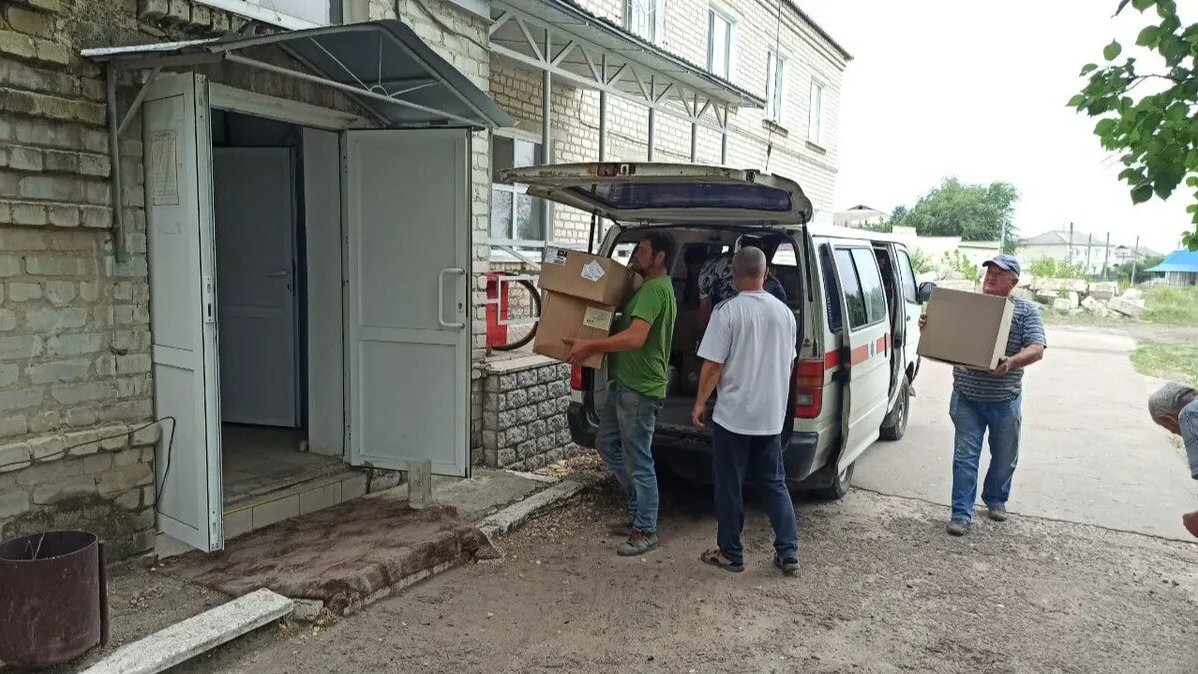Svatove, the Luhansk region city and municipality centre with a population of about 25,000 people, was occupied by Russian forces at the beginning of March.
Before that, Svatove was often used as a sort of an example, Ukraine’s trump card in the region that saw a dividing line appear with the creation of the self-proclaimed “Luhansk people’s republic” (“LPR”). Svatove was reliable. No one has ever raised neither a separatist flag nor a Russian tricolour in Svatove.
The local authorities have given enough interviews on the subject: they say that, in the spring of 2014, self-defence militias — about fifty men — under their command armed themselves with their own hunter carbines (according to other versions, they “borrowed” service pistols at the local police department, the employees of which had already been ready to surrender without a fight), put up security checkpoints, blocked roads, including the field ones, and did not let invaders enter the city — the Prizrak Brigade led by Aleksey Mozgovoy, a Svatove township native, ex-employee of a local military commissariat and a soloist in a local choir. (In May 2015, Mozgovoy and his motorcade were killed in a car ambush on the Perevalsk-Luhansk road — orchestrated either by special forces of the HUR, Main Directorate of Intelligence of the Ministry of Defence of Ukraine, or possibly by the Luhansk separatists, but that is a completely different story).
The steadfast city that did not betray its country then became the location for the regional administration, Prosecutor’s office, and other government structures, not to mention the arrival of refugees from the nearby localities from “behind the line”. The local court had to work thrice as hard: deal with its own caseload, and add to it the work of the Krasnodon city court and the Luhansk Lenin district court, both of which ended up on the occupied territories. The majority of criminal proceedings had to do with the Donbas armed conflict. This is me recounting my story Tilnaya Storona from Svatove published in Novaya Gazeta in the summer 2018.
The state of the regional centre back then led to no doubts — “Russian peace” would not be welcome here, they could stop waiting. The streets were full of the sound of the Ukrainian language, and even more often, of Surzhyk, a special Slobozhanskyi dialect. The City Council building was decorated with portraits of Lesya Ukrainka, Nikolai Gogol, Stepan Bandera, etc. Other portraits were hung on the second floor — so that vandals could not get to them. In the best European traditions, the council building was adjoined by a children’s playground with slides and swings and by a fashionable bicycle parking station. A small park nearby was full of statues of angels, hiding in between rose bushes, and, obviously, there was a sculpture of Jesus Christ. Every installation had a sign saying “A gift by a local patron this and that” underneath it. Merchant traditions live on! And there was also a memorial: in a row, there stood a monument to the victims of Holodomor, plates with names of the natives killed during the Second World War (the stela says: “1939-1945”), a monument to the victims of Chernobyl, a monument to the soldiers killed in Afghanistan, and an obelisk “In loving memory of Ukraine’s defenders” with engraved death dates of soldiers born in the middle of the 90s — 2014, 2016, 2018…
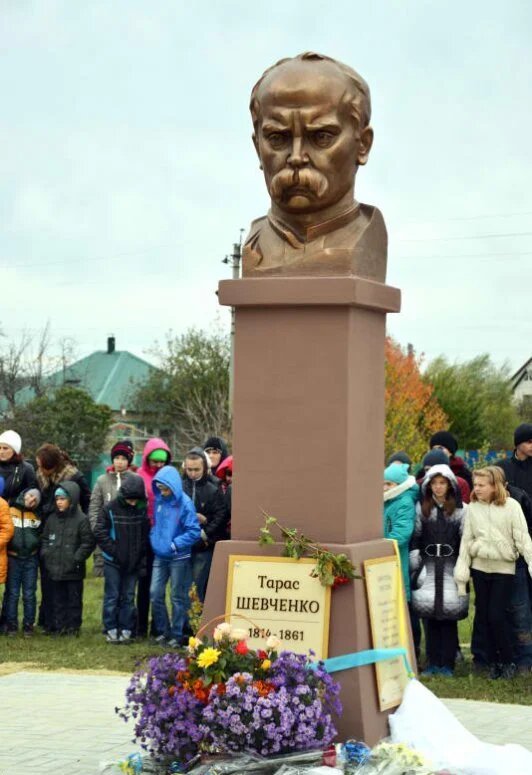
A bust of Taras Shevchenko in Svatove. Photo: svatovo.ws
The only thing looking a bit grotesque was the recently opened bust dedicated to Taras Shevchenko: the gilded head was big, disproportionate to the pedestal. As if the Svatove leaders tried to highlight in a way that even Kyiv had to pay attention to — we are taking the national rebirth seriously, do not worry!
Supermarkets seemed to be doing quite decently, even though the prices did not differ much from the Kyiv ones. Cafe Neposeda (with air conditioners, bright furniture, and an interesting menu) had almost no free tables in the middle of the day — couples and groups were having lunch. Thus, they had the means to spare.
Obviously, I verified my initial feelings, talked to both townsfolk and local government officials. Some conversations appeared in the story, some not. While the details that other interlocutors preferred not to remember or say “in a way that newspapers want”, like the ones told to me by a Svatove businesswoman Nataliya Melnik (for the safety of the person whose relatives had stayed on the occupied territory, I will not be currently using her real name, last name, and profession — O. M.), seemed to me, at the time, disproportionately exaggerated, like the head on the pedestal…
The leaders “got lost” first
Five years later, I am talking with Nataliya, a forced migrant, in a cafe, in the suburbs of Kyiv. There is a pine forest behind the windows, nearby — there is a modern residential building, the facade of which at the higher floors was damaged by tank strikes. There is a black collapse in the place of a balcony, the windows are boarded up with plywood. A view from one of the windows is a blue and yellow flag, not torn apart simply by miracle. Kyiv had managed to drive out Russian occupants in a month. How many years it will take to heal the wounds — unknown.
Nataliya, a realist and a business person, says that she will probably not go back to her hometown even after the region is liberated: “The occupation has spent all this time gradually capturing the minds of the people living there — information-wise and politically. During the last local elections in 2019, people from the Opposition Platform — For Life party won, this is the ex-patry of the regions of Yanukovich. The new local government was formed out of these people. The people, who maybe not directly, but continued to support a union with Putin’s Russia.”
“Why did they get elected again?”
“Again? They never went anywhere. In 2014, they just didn’t manage to widen the “LPR” borders. But back then the external force were pro-Russian Cossacks, while today it is a regular army.”
Also, eight years ago, according to Nataliya, the city’s defence was not anywhere close to heroic epics. Mozgovoy’s gunmen suddenly entered the city territory, surrounded the administration, and did not meet any resistance. Actually, the opposite. The police at once took down the Ukrainian flag from its building, so did the court. They acted too fast! Mozgovoy had no plans for capture of the city, he was on his way to the village Nyzhnia Duvanka, to say goodbye to his deathly ill father. To justify that day’s actions, a legend was created.
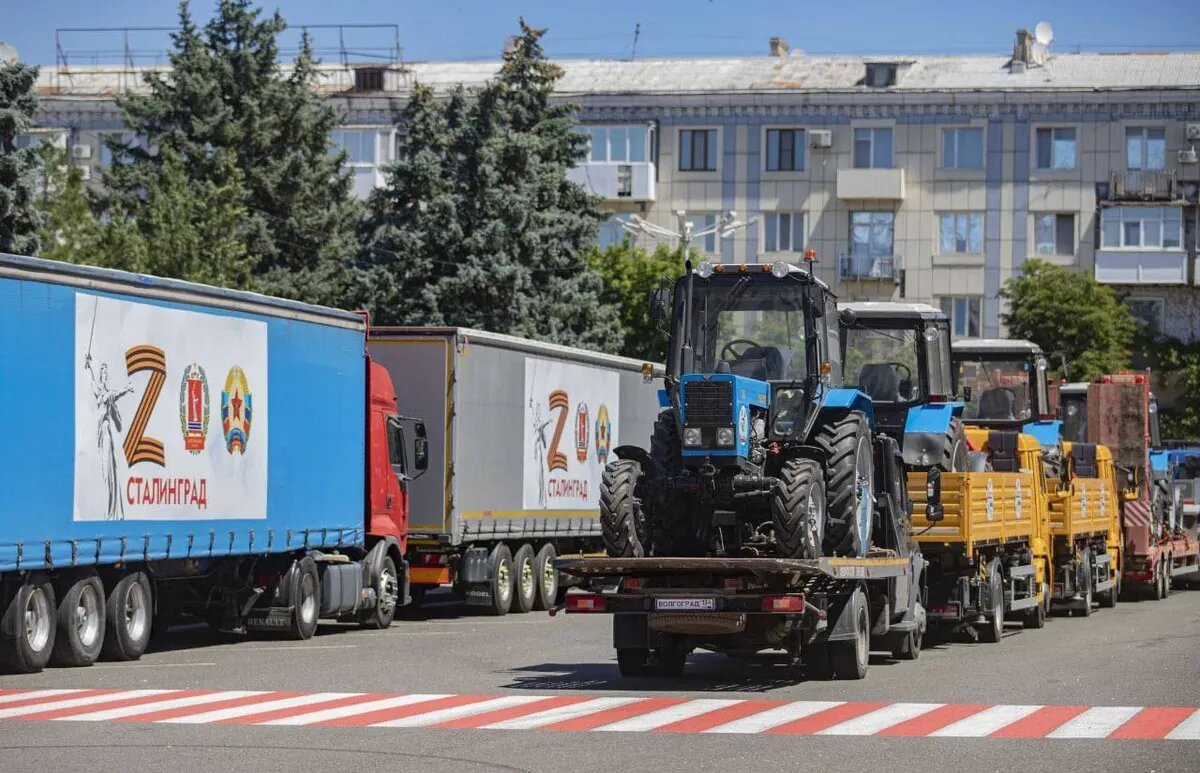
Humanitarian aid from Volgograd to Svatove. Photo: Telegram channel svatovoLNR
At the beginning of March 2022, the situation was different. Two-three Russian tanks, an armoured personnel carrier, and military machines came down to the city borders several times, for reconnaissance. Unlike Kyiv or Kharkiv, Svatove did not get hit with missile strikes or shelled by heavy weapons. There was only one strike on the Ukrainian army object located here. That was the end of the fighting.
“And the city's defence?”
“On the eve of the occupation, the administration made it seem like it was creating militias. They invited a group of local roms, they were always called upon when they needed to showcase their work with different parts of the population… And on 23 February, a day before the invasion, the head of the district administration Oleh Slipets suddenly disappeared.”
“He didn’t become a wartime collaborator,” clarifies Nataliya. “He just “got lost”. Allegedly, he moved to Dnipro and even continues to receive his paycheck there.”
The City Council employee Vita Slipets (not a relative, just the same last name) began to head the administration. Together with a group of activists with Ukrainian flags, she negotiated with Russians. The recordings were published on Facebook. Thus, they did what they could. The police chief officer disappeared. The senior officer Anna Ruban had to take the police leadership in her hands. Essentially, the law enforcement suffered the same fate as in 2014. Only this time, no one cared about a necessary pr angle.
“There was a small number of people that actually wanted to confront Russian occupants,” says my interlocutor. “The Potemkin village has fallen.”
The sittighters (this is how Ukrainians designate those who actively or passively waited for the invasion — O. M.) have won in Svatove.
Nataliya remembers: literally days before the war, on 16 February, the day of Ukraine's day of unity, just announced by President Zelensky, the local officials took pictures draped in blue and yellow canvas, as if in cocoons. They also made citizens take part in the celebration, just like in Soviet times. They filed a report on their achievement: their flag was the biggest — it spread from the Svatove Victory square to the Zlagoda (Agreement in Ukrainian) maidan. In a few weeks, these officials would become the occupation government members.
“And when the Ukrainian flag was replaced with the tricolour, the nth external “change of reality” was received pretty well by the majority of people,” emphasises Nataliya.
I begin to remember the portraits on the City Council building, from Lesya Ukrainka to Stepan Bandera. More smoke and mirrors?
“One of the first portraits to hang there was of an ex-First Secretary of the Svatove district council of Ukraine's communist party Ivan Zaburdaev,” she retorts. “The Lenin monument was dismantled, but Zaburdaev is with us for the rest of the time.”
According to Nataliya Melnik, Viktor Yushchenko's presidency was the only time when there were attempts to make sense of what locals wanted and needed. Later, Kyiv demanded only a picture of harmony, not any actual transformation. Even later on, came activists making scenes in supermarkets: someone dared speak Russian! The social lifts led careerists that capitalised on things that were not based in reality towards joining pro-Ukrainian and pro-European parties. The population was resentful — the quiet does not last, as people knew from before. But they still perceived everything pro-Ukrainian as done for show, a beautiful decoration with no substance.
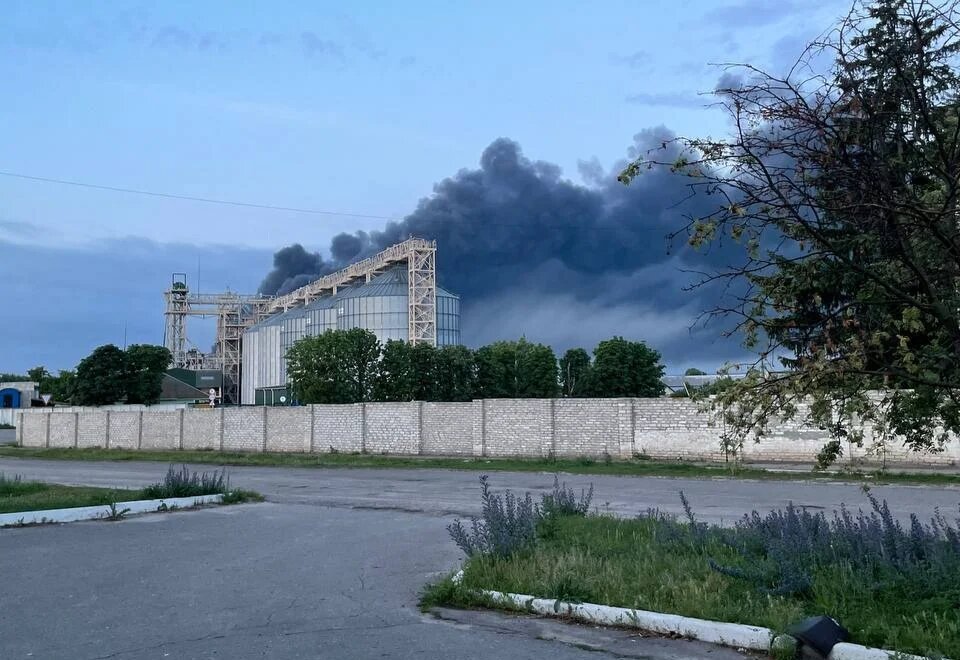
Fire in Svatove following shelling. Photo: Telegram channel Svatovonews
The reaction led to the 2019 election results when the Opposition Platform — For Life party won a majority in the district council. The same party prepared the ground for a full scale occupation. Add to that Russian TV channels that had been broadcasting there as if they were home for a long time. Imagine what they are showing now…
Nataliya shares a story: recently, a cluster projectile hit the centre of the city, several adults and a child were killed. Her brother, a serviceman of Ukraine's Armed Forces, got a call from a neighbour: “Yura, I will burn your place down! Why did you shell us?!” Meanwhile Yura's wife, children, and grandchild were still in Svatove. “Will you, please, look at the direction, where did the projectile fly from! Turn your brain on!” begs Yura. No result. Russian TV said that it was Kyiv attacking Svatove, so that is how it is.
Getting personal
Ludmila Pavlovna Rusanova was the head of the district council before the war, and has now become the “LPR” administration head. Although the real power, of course, is the military, Russians in uniforms. Neither my interlocutor, nor other residents, not Rusanova herself know their last names. Against regulation.
“Did she not plan on leaving the occupied town? Or organise the resistance?” I ask.
“In 2014, Ludmila’s son and several others got suspended sentences,” shares Nataliya. “They blocked the railway tracks so that a Ukrainian echelon bringing arms supplies to Donbas wouldn’t pass…”
Rusanova started in the communist party and is now a member of the Opposition Platform — For Life party. Her entire life, she served in leading roles: school director, education department head, deputy head of the district administration. Nataliya Melnik clarifies:
“However, Ludmila Pavlovna isn’t one of those fanatics that ran around with ribbons of Saint George, screaming “Russia, let’s go! Putin, bring in the troops!” The exact opposite, on the day of unity of Ukraine, she stood there with a blue and yellow flag. The problem is that, here, the powerful people are always those who got used to the Soviet mimicry. If tomorrow Ukraine comes back, do you think that she will sincerely not want to serve the system? The population, by the way, is happy that Rusanova has stayed, hasn’t abandoned them, and has been solving their problems. She will even warn people if they are about to get in trouble: “Stay quiet, don’t go anywhere!” Even though she’s already on the Mirotvorets (a Ukrainian website that publishes personal information of people who are considered to be "enemies of Ukraine.” — translator’s note) list, as a wartime collaborator and traitor.”
“And are there any fanatical supporters of “Russian peace” in the city now?”
“Of course. What was surprising is that there are a lot of businessmen among them. Recently, they organised an auto marathon for the “Republic” day. A few dozen cars, with the “LPR” flags, men with the Z-sign t-shirts. One of them, Oleksandr Tretyak, sent his 19-year-old daughter Lisa to the hospital — to take care of wounded Russian soldiers. She gave an interview to Russian TV: how great it is that Svatove has been liberated!”
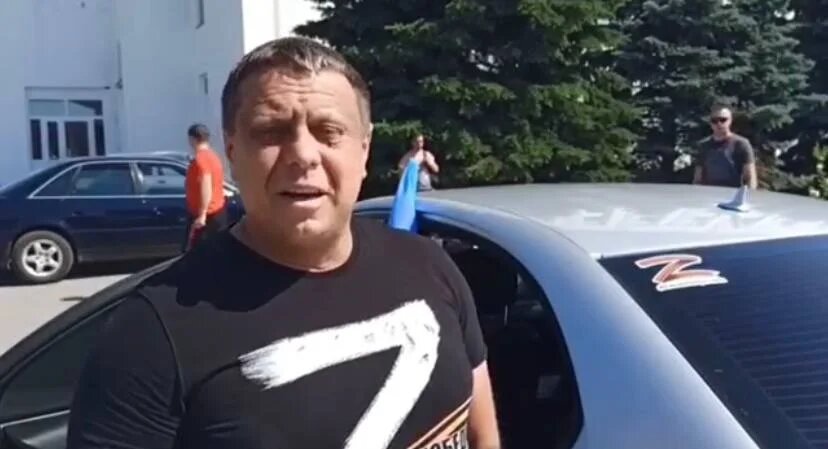
Local businessman Oleksandr Tretyak. Photo: a video screenshot
“Why? Svatove used to be famous for its millionaire farmers, I thought they had different preferences,” I wonder.
“And yelled “Glory to Ukraine!” louder than anyone,” agrees Nataliya.
She has a hypothesis: the majority of local successful businessmen are children of the Soviet and party leaders from Donbas. So, the start-up money had been used for family businesses. The moral compasses came from the same place — lie to any government for your personal gain.
Media personas are another conversation. A journalist of the Svatove TV-Radio company Pavlo Kushch has become a deputy of the district council by using patriotic themes. Before that, he used to love making pretentious video reels from checking points. He also knew how to use a grenade launcher better than most due to past experience: here is how Ukrainian defenders are stopping the Russian horde! Today, Kushch is Ruslanova’s deputy, he heads the organisation department. He is happy that his talent got recognised. Others did not get such an opportunity. They continue on with their jobs, just like, before only now with their main perspective being Russian.
I ask how the local police, security services, and judges acted after the invasion. My companion names a small Telegram channel that publishes photos and dossiers on those who had broken their oaths. Most of them are police agents, just like in 2014. Did the police reform have any impact on the recruiting process?
“About 30% of the police personnel swore allegiance to the new government,” says Melnik.
So did retired officers. Ex-policeman Rudenko, honoured master of sports, kettlebell lifting athlete, already in advanced age, went to serve in the “LPR militia”. So did the ex-head of the Svatove State Auto Inspection. Judge Yurchenko, thought of in Svatove as the number one corrupt official, left his hometown and retreated to parts unknown. Everyone knew: the judge is also a big landowner. While using one hand to sign sentences, he used another to sell sunflowers and check the revenue in his stores. “He got scared that he’d finally get put in jail!” concluded the locals. For the time being, they think of the current situation as city order getting restored.
The richest farmer of the district, previously a communist party deputy Volodymyr Kunitsky, who is, by the way, father of the ex-head of the CIty Council Vita Slipetc, tried to negotiate cooperation with the new authorities. Essentially, with the Russian Commandant's Service. And he almost succeeded. But then a rotation happened, and new soldiers arrived. Someone let them know: Kunitsky owns almost 40% of arable land in the Luhansk region — he is a billionaire! The Russians decided to take everything they could, by force. So, they found him and beat him up… The daughter managed to evacuate her father out of Svatove to the territory under Ukraine’s control.
“But when she was asked for help by people fighting on the frontlines: “Vita Vladimirovna, we need money to buy bulletproof vests!”, she started complaining: “I fled with one little suitcase, I don’t have any money!” records Nataliya.
The Svatove merchants did not just accept the Russian occupation, they at once tried to use it for profit, raised prices. They hurried to Luhansk to buy goods — the divide line was no more, while patroil was now very cheap. Even though the patrol price is still “Ukrainian”, a.k.a. high, at gas stations. There is a new service in the city known as “cash-getting”, which comes with a 25% commission. For example, a pensioner cannot go to a territory under Ukraine’s control to use a cashpoint to get money. He gives his card to a “cash-getter”. That person brings him his pension in hryvnia and without any embarrassment takes a 25% cut. Almost all entrepreneurs now take part in this kind of business.
Currently, about half of its population is still in Svatove. Many migrated to territories under Ukraine’s control, even though the city suffered almost no losses from shelling.
“In any case, people need food and an opportunity to see a doctor. We shouldn’t be considering the critical infrastructure employees wartime collaborators — I mean, firemen, rescuers, utility employees. Children need to go to school. So, there is a need for teachers. Would it be better to send every person that provides the city’s vital functions in the occupied territories to Russia?” I ask.
“The majority of doctors have left Svatove,” replies Nataliya Melnik. “And have not moved to a foreign country where they could earn more, even though they have good qualifications, they could find a job there easily. They have gone to Dnipro, Poltava. I am in contact with a lot of them. They are waiting for the Ukrainian army to start a counter-offensive, they want to come back home. So, unlike the government officials that used patriotism for their own profit, our doctors turned out to be real citizens. They always had their own position.”
Meanwhile, 99% of primary school teachers instead went to a “training” in Russia to make it back in time for the new school year. Only two people refused to go.
Since the beginning of the invasion, Ukraine’s State Bureau of Investigations has opened 480 criminal cases on suspicion of wartime collaboration, treason, and high treason. Ukrinform, Ukrainian state news agency, cites Tatiana Sapian, bureau’s Communication Adviser: “More than a hundred allegation reports were handed to suspects, four indictments were sent to court, and there are first sentences already. Judges record cases of deliberate changing sides to that of the occupier when it comes to law enforcement agents, judges, and government officials. They also record any assistance to the Russian occupation government.”
Meanwhile, Adviser to the President of Ukraine Mykhailo Podolyak wrote in a tweet: “Every government official that agrees to work with the occupants, has to comprehend that they are signing their own verdict and have become a legal target for Ukraine’s special forces and courts.”
Kyiv
Join us in rebuilding Novaya Gazeta Europe
The Russian government has banned independent media. We were forced to leave our country in order to keep doing our job, telling our readers about what is going on Russia, Ukraine and Europe.
We will continue fighting against warfare and dictatorship. We believe that freedom of speech is the most efficient antidote against tyranny. Support us financially to help us fight for peace and freedom.
By clicking the Support button, you agree to the processing of your personal data.
To cancel a regular donation, please write to [email protected]
